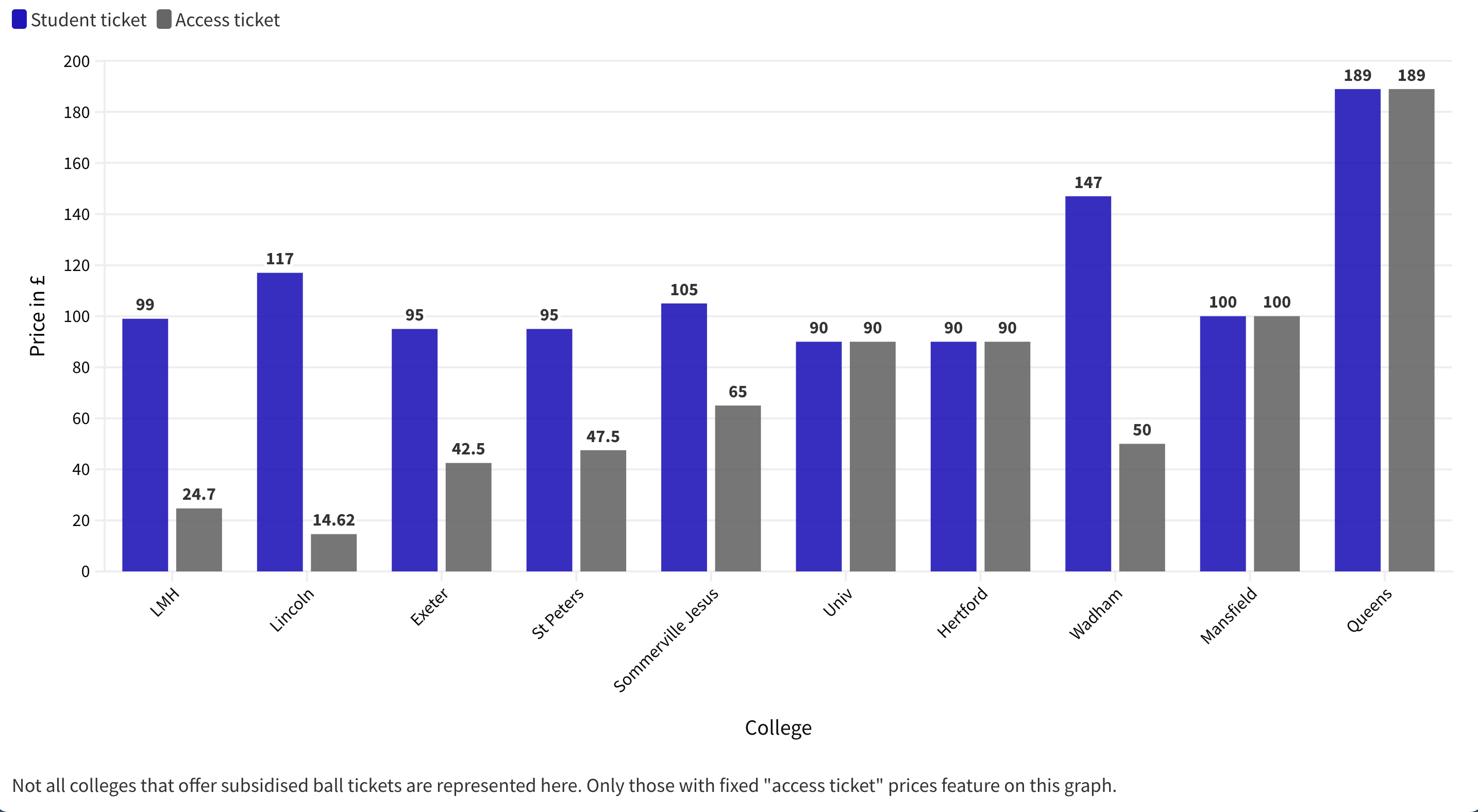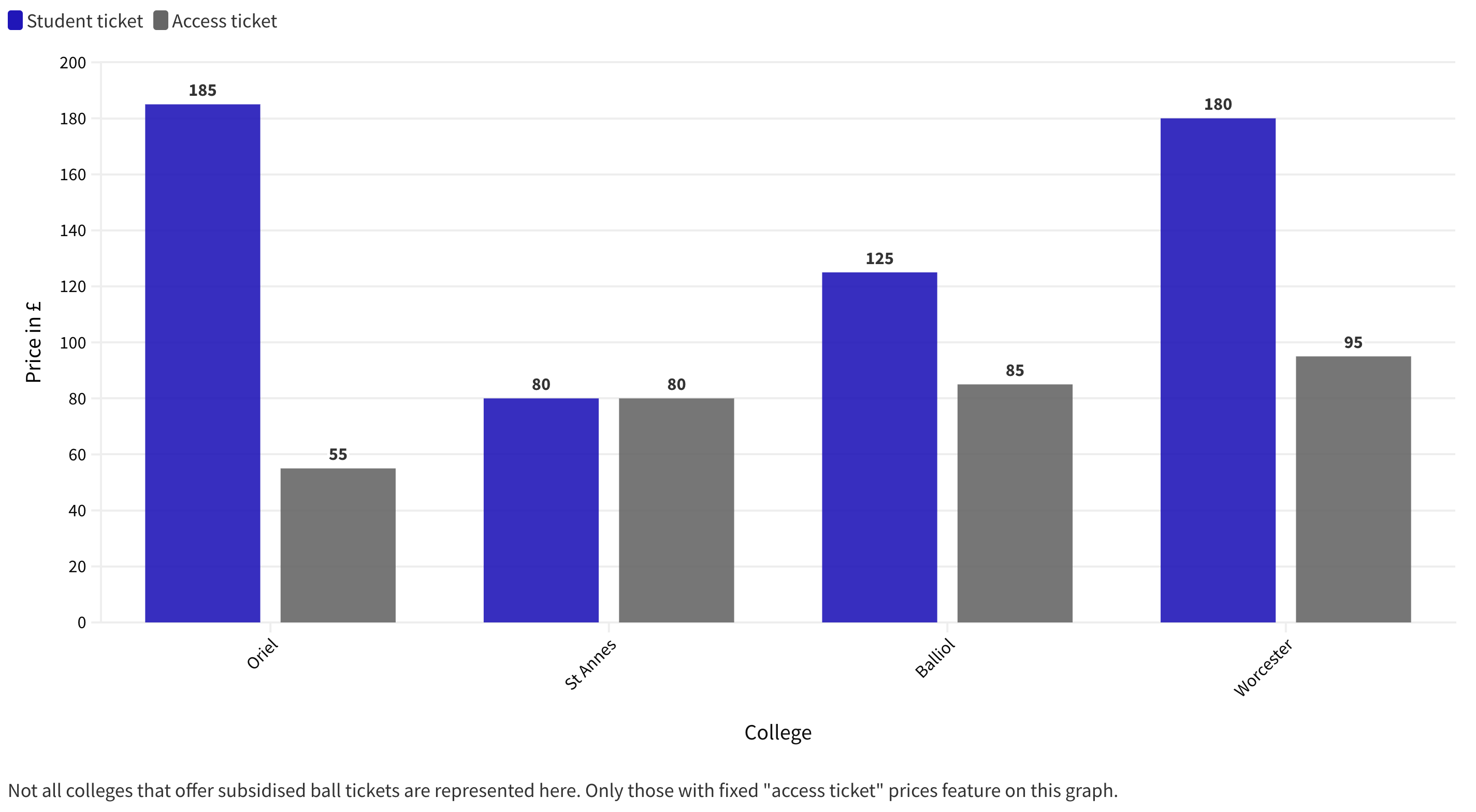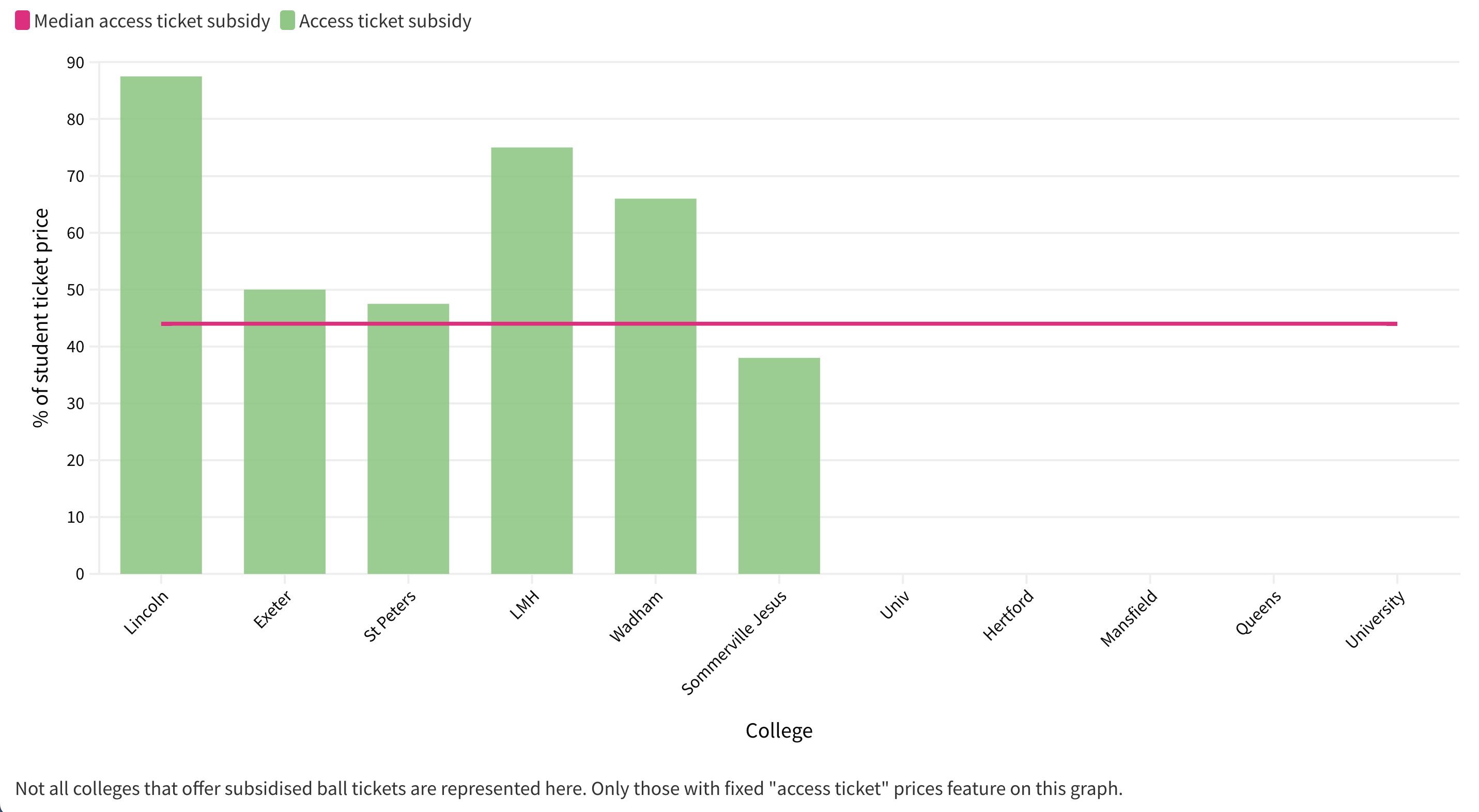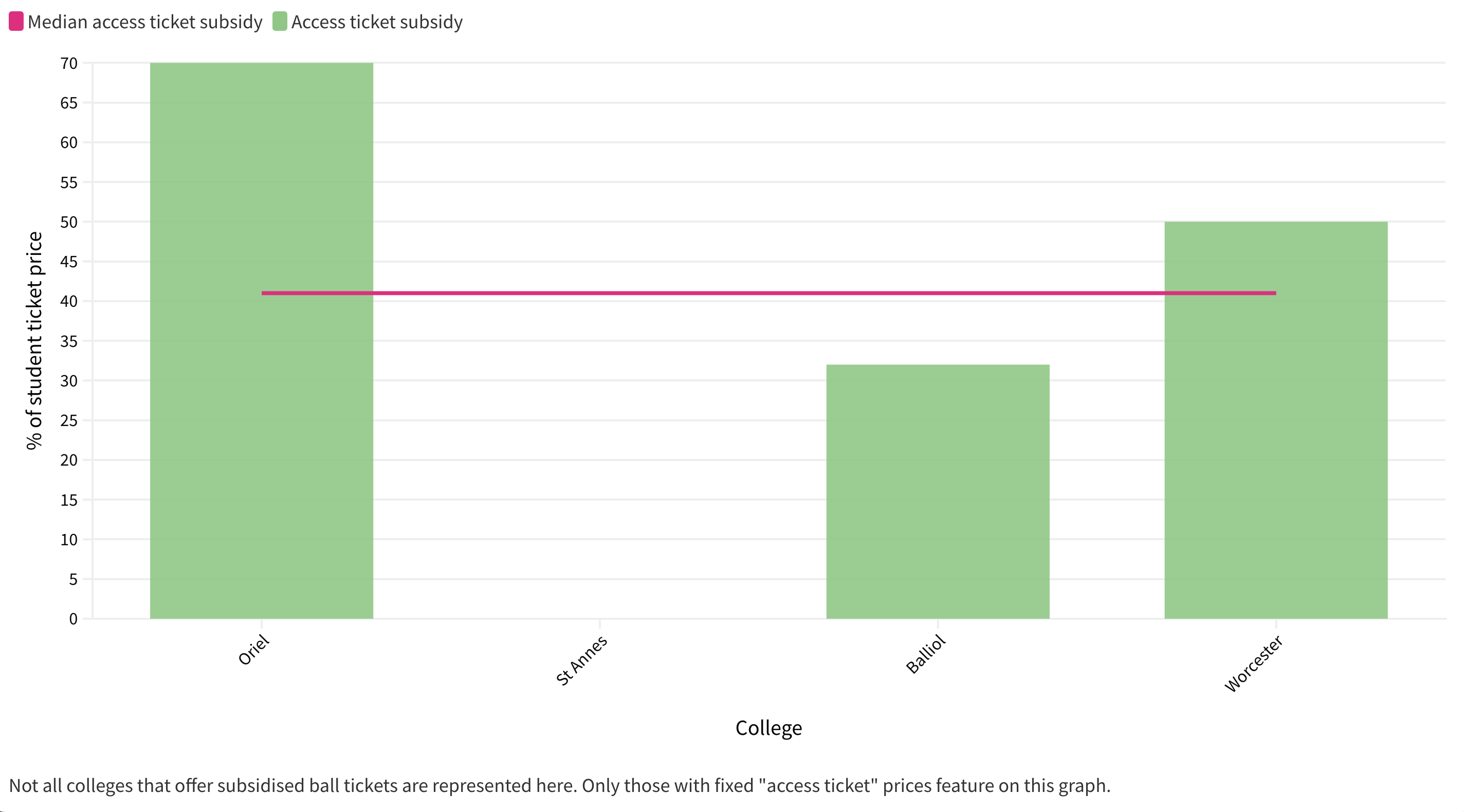Cherwell has found that college balls are becoming less affordable, despite increased access initiatives. While the median standard ticket price has decreased over the last year, the median price of “access tickets” has increased. Students from low-income backgrounds or facing financial hardships are often priced out of attending balls, even at their own college.
Last week, the news of the St Hugh’s Ball cancellation angered many Hughs students and raised concerns for those who had purchased an access ticket for this event. These tickets were amongst the cheapest on offer this season, being sold at half price, £57.5. Given that the stated reasoning for the failure of the ball was financial risk, tied to insufficient ticket sales, this raises deeper concerns than access to one event. In regards to affordability of balls at Oxford, there is a serious question for whether accessibility remains affordable.
The median ticket prices for both white and black tie college balls are lower than last year’s by about £11. The price of the median access ticket, however, has risen by about £25. This exceeds the impact of inflation, meaning low-income students are paying more in real terms.


Moreover, the access tickets are amounting to less of a discount when compared to the price of a standard ticket. The median access ticket last year was 44% less than the median standard ticket, while this year it is only 41% less.


The value of the subsidies provided does not appear to correlate with the percentage of low-income students at each college, according to figures listed in the 2021 annual admissions report. Colleges with a proportion of low-income students above the university average of 13.3%, like Mansfield and Hertford, did not sell any access tickets last year. Meanwhile, Lincoln College, where only 5.9% of 2021 admits were from low-income backgrounds, offered some of the most generous access ticket prices at 25% of standard price or free. The disparity of subsidies across colleges demonstrates that access measures are not always adapted to assist those with the most need.
The relative wealth of a college has an understandable impact on the availability of access tickets, though not as dramatic as may be expected. All but one of the five wealthiest colleges per capita did not offer subsidised tickets for its students. On the lower end of the scale, the poorer colleges tend to not offer access tickets, with the significant exception of Lady Margaret Hall, which boasted comprehensive access schemes for their ball. At LMH, all Crankstart scholars and those who have previously completed the Foundation Year programme received half-priced tickets to the 2022 ball, while those currently on the Foundation Year programme attended the ball for free.
This comparison does not take into account colleges which offer flexible reimbursement or other access schemes of unspecified monetary value. Three balls fell into this category last year, including St Catherine’s ball, “Eclipse”. The Catz JCR voted to put aside £5000 to ensure “that any JCR member that wants to come to the ball but for whatever reason is unable to pay the full ticket price can get support”. Following this announcement, an email was sent to all undergraduates a week before ticket release explaining how to apply for “a fully-subsidised or partially-subsidised ball ticket”.
Amongst the balls in 2022-23, three balls are implementing similar broad affordability schemes, including Merton’s and Magdalen’s white tie commemoration balls. On the whole, it seems that those wishing to attend a white tie ball are more likely to find access tickets: six out of seven of the commemoration balls within the past two years offered subsidies and reimbursements. Many white tie balls also develop partnerships with local dres shops and clothing rental services. New College, for example, partnered with Rathbone Tailors to provide a 20% discount for clothing hire. However, hiring a full suit with a tailcoat or an evening gown with optional gloves and tiara, as is required by the dress code, can cost nearly as much as a ticket for a cheaper ball.
The only white-tie ball which did not offer significant quantities of tickets at low cost was Queen’s’, the cheapest white tie ball in 2022. General rather than targeted affordability seemed to be a priority of planners in this case.
David Hamer, Co-President of this year’s Crankstart Ball, understands this strategy. Since the allocation of access tickets is limited, means-tested, or restricted to a certain bursary category, it can be difficult to fairly distribute these subsidies, especially since financial information is protected and personal. Hamer admits that “you could definitely argue that the only appropriate action is to reduce the cost of the ball for all and sacrifice some of the extravagance for accessibility”. However, he caveats his statement, adding that the money lost in cheaper tickets would have to be made up in college support or sponsorship.
This year, the overall decline in ticket prices does not help the students who would most benefit from subsidised tickets. Bursaries from the UK government, the University of Oxford, and colleges help students pay for living expenses and other costs of student life. However, the government Maintenance Loan has not risen on par with inflation over the last year, rising only 2.3% while the Consumer Price Index has risen 9.2% year on year as of December 2022. In contrast, the university’s flagship scholarship program for students from lower income households, the Crankstart Scholarship, has risen by £500. College financial support varies from dedicated bursaries to hardship funds.
Nonetheless, there are options for students whose college does not offer a sufficiently inexpensive ball. Many society balls, like the LGBT Society’s Glitterball or the University Biological Society Ball, offer ball tickets below £60, though some require membership to obtain the lowest priced tickets. The Crankstart Ball, the first event of its kind dedicated to low-income students in many years, sold all tickets for under £70, including guest tickets. Crankstart scholars also received tickets costing around £59.
The Crankstart Ball organisers wanted to make the event as “accessible as possible”. In Hamer’s experience, “there has absolutely been an expectation at Oxford for students to go to college balls.” This expectation – combined with the decision of many colleges to evict students from certain areas of the college on the night of the ball – means that even those who cannot afford the tickets feel pressured into buying them anyways.
With the increase in cost of living and the decrease of access tickets, balls are becoming less affordable for low-income students. If only the most extravagant commemoration balls, at the richest colleges, offer meaningful access schemes, then the tradition of the Oxford college ball may become increasingly out of reach.


